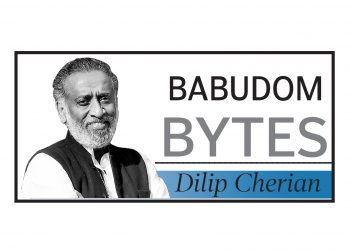Tamil Nadu Governor RN Ravi has trodden on many toes in the state government and the ruling party, be it withholding important bills or speaking his mind on Centre-state relations. Some may say that the situation seems to mirror a similar tussle in neighbouring Kerala, also a non-BJP-ruled state.
The latest salvo from the Governor has left Chief Minister MK Stalin fuming, and his party colleagues pushing for Ravi’s ouster. Ravi’s advice recently to IAS and IPS officers to prioritise the Centre’s policies over those of the state has raised the question of allegiance: whom do the babus serve? This is particularly concerning given that officers are assigned to a state cadre until their retirement, but the Centre has the power to bring them to the Central services on deputation. So while officers are meant to serve the people in their respective states, they are also required to adhere to the policies of the Central government. This often creates conflict between the Centre and the states, especially when officers are called to the Centre for deputation.
Observers have pointed to the recent controversy in West Bengal as an example of strife. In this case, the then Chief Secretary was recalled to the Centre after he failed to receive Prime Minister Narendra Modi during a visit to the state. Not surprisingly, such tussles are being witnessed in West Bengal, Tamil Nadu and Kerala – all non-BJP-ruled states. The ongoing political battles often leave hapless babus in these states in the middle of the crossfire.
IOCL faces leadership crisis
The Indian Oil Corporation Limited (IOCL) is currently facing a leadership crisis, with several high-level positions set to become vacant in the coming months. In addition to the Director of Finance appointment being stalled due to a court case, three board-level positions are also falling vacant with the PESB putting its recommendation for the post on hold, in response to a Delhi High Court ruling.
The Director of Pipelines, DS Nanaware, and the Director of R&D Dr SSV Ramakumar will retire in June and July respectively, while the tenure of the Chairman and Managing Director Shrikant Madhav Vaidya is ending in August. Curiously, the Director of Human Resources, RK Mohapatra, completed his tenure in February but is still serving!
The court case surrounding the appointment of the Director of Finance has halted the selection process, with the Public Enterprises Selection Board (PESB) putting its recommendations on hold. The petitioner, a chief general manager at IOCL, has contested the shortlisting process, claiming that he too fits the eligibility criteria but was denied, and that preference was given to chartered accountants over cost accountants. Whatever the truth or merit of his claims, the court case has created a further delay in the already depleted leadership of the IOCL.
Whatever the government decides to do with him, in the weeks ahead the IOCL board is staring at five vacancies! The government will need to move quickly to ensure the smooth functioning of IOCL.
No private awards for officials without approval
The recent instruction issued by Kerala Chief Secretary VP Joy prohibiting IAS and IPS officers in the state from accepting awards from private organisations or individuals without prior approval from the government has sparked a conversation about the ethics of receiving awards in public service. The move comes after a section of the Kerala Police personnel protested against an IAS official receiving an award from a private organisation for the successful handling of worshippers at a famous temple in the state.
The order not only stresses the need for transparency and accountability in public service but also highlights the importance of public officials focusing on their duty to serve the people rather than personal gain or recognition. The widespread practice of government officials accepting awards from private entities has become so common that it rarely raises eyebrows anymore. However, it raised questions about the motives behind these awards and whether they are truly deserved.
Joy’s order has set an important precedent for babus across the country. However, the bigger question remains; can he make it stick? It will require a change in mindset and a willingness to place public service ahead of personal gain for this directive to be effectively implemented. Further, it would benefit everybody if the approval process is transparent and impartial, with no room for favouritism or nepotism. Ideally, while the hard work and dedication of officials must be duly recognised, the recognition should come from the government or independent bodies rather than private organisations.
Share a babu experience! Follow dilipthecherian@twitter.com. Let’s multiply the effect
